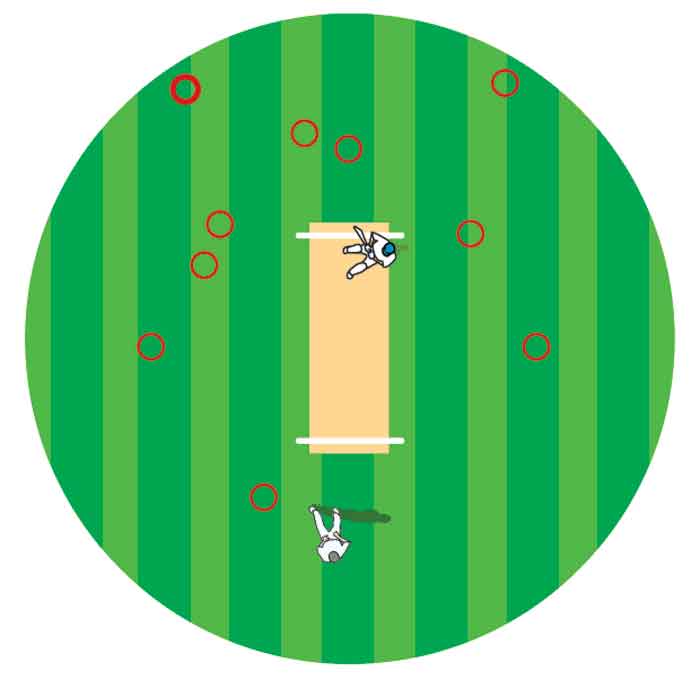The MCC’s decision to change “batsman” to “batter” to make the expression gender neutral has provoked a global debate about whether the whole language of cricket will be revised to take account of women players.
“So does third man now become third person?” was a typical rhetorical question posed by a Daily Mail reader.
Not for the moment, it seems.
A spokesman (spokesperson?) for the MCC told The Telegraph: “The fielding position ‘third man’, along with other terms like ‘nightwatchman’ and ‘12th Man’, are not included in the Laws, and so any changes to such terms are outside of MCC’s control as Guardians of the Laws.”
The Daily Telegraph’s Tim Wigmore pointed out that the change from batsman to batter had come “just weeks before Clare Connor takes over as MCC’s first female president in its 234-year history.”

A graphical representation of some random fielding positions, including third man
Connor, a former captain of the England women’s cricket team, is currently managing director of Women’s Cricket for the England and Wales Cricket Board (ECB).
The Daily Mail said: “The switch follows The Hundred competition in the summer, which also swapped the widely used Man of the Match to ‘Hero of the Match’.”
Former England captain and BBC commentator Michael Vaughan tweeted: “Let’s be honest if this has annoyed you get a life….it’s absolutely fine & a good move.”
The Daily Telegraph carried opinion pieces reflecting both sides of the argument.
Its right-wing commentator Simon Heffer said batter is a noun “more usually associated with the stuff fish is fried in, or with which one makes Yorkshire pudding — or, worse, that the verb has associations with horrible people who beat their wives and children”.
He complained: “As an MCC member myself, I was not consulted — and nor were hardly any of the other 18,000 of us.”
He suggested that “no one would object to the use of the specific noun ‘batswoman’ in women’s cricket. There is a more sinister point here. Just as MCC has lately prostituted itself by pretending, for purely financial reasons, that The Hundred is really cricket, it now seeks to show how in tune it is with the modern world by adopting this revolting word where a perfectly serviceable and universally understood one had long existed.”
He argued: “Changing a word may be a small matter to those outside the game, but
to those of us who love cricket it is a sign of something sinister and self-destructive.
There will be toadying conformists who love what has happened, and doubtless commentators will be ordered never to utter the word ‘batsman’ again.”
But the case for change was made by commentator Alison Mitchell, who said: “Incorporating the word ‘batter’ into the laws of cricket doesn’t feel like a seismic change because the term has already been in the cricket lexicon of modern day players for a while now. High profile cricketers like Jos Buttler,
Virat Kohli, Steve Smith and Joe Root have been using the term interchangeably in the men’s game for a number of years. The term is commonplace in the women’s game. The MCC are now bringing the two together, and in
doing so reinforcing the positive sense of cricket being a game for all.
“The message may be a subconscious one, but it is significant. Language is powerful.
“Think how many times ‘the Ashes’ is referred to, without any clarification as to whether it’s the men’s or women’s version. Invariably, it will be in reference to the men’s, because historically it has only been the men’s Ashes which has informed the mainstream conversation.”
There is trouble brewing here, too. Despite a personal appeal from Boris Johnson, the British Prime Minister, his Australian counterpart, Scott Morrison, has said the country’s strict Covid quarantine laws will not be relaxed to allow families to accompany England men during their Ashes tour this year. Some cricketers have threatened to pull out. The England women will travel in the New Year for a multi-format Ashes tour.











